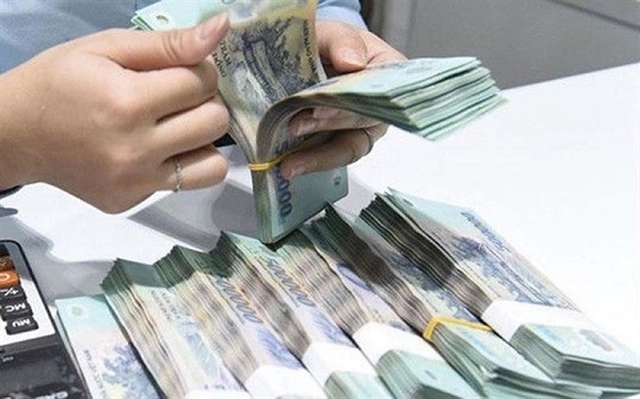 Economy
Economy


|
| A Vietcombank branch in Hà Nội. The SBV is coordinating with relevant ministries to consider and submit to the competent authorities for approval a plan to increase charter capital for State-owned commercial banks including Vietcombank. VNA/VNS Photo |
Compile by Thu Hà
Many banks plan to increase their charter capital in 2023 in order to ensure operational safety and have more resources for business development.
Data from the State Bank of Việt Nam (SBV) showed that by the end of 2022, the charter capital of the whole banking system reached VNĐ876.99 trillion, up 13.04 per cent over the same period last year.
The charter capital of State-owned commercial banks was VNĐ190.43 trillion, an increase of 5.75 per cent over the same period in 2021 and the number of joint-stock commercial banks was nearly VNĐ469.41 trillion, an increase of 19.26 per cent over the same period in 2021.
In a recent report sent to the National Assembly’s Economic Committee, the SBV said it is coordinating with relevant ministries and branches to consider and submit to the competent authorities a plan to increase charter capital from profits after tax and after setting aside funds in the 2021-23 period for State-owned commercial banks Vietcombank, VietinBank and BIDV; and from the State budget for Agribank.
At the same time, the SBV also directed Vietcombank, VietinBank and BIDV to develop a plan to increase charter capital from profits after tax and after setting aside funds in 2021 to submit to the Prime Minister for approval.
As for Agribank, the Government on April 25 issued a resolution on additional investment in charter capital for the bank. Accordingly, the SBV’s Governor will be authorised by the Prime Minister, on behalf of the Government, to report to the National Assembly on charter capital addition by VNĐ17.1 trillion for Agribank in the 2021-23 period.
In order to prepare for the capital increase plan, at the general meeting of shareholders in 2023, Phạm Quang Dũng, chairman of Vietcombank, said Vietcombank's capital increase plan of about VNĐ27 trillion will be from three sources including profit in 2020 and the remaining profit of 2019 with the issuance rate of 18.1 per cent approved by the Government; profit of 2021; and the remaining accumulated profit before 2018.
Vietcombank’s capital increase policy was agreed upon by the SBV and the Ministry of Finance. The bank is preparing procedures to submit to the competent authorities for approval.
In 2023, BIDV plans to increase its charter capital to more than VNĐ61.56 trillion by issuing nearly 642 million shares to pay dividends to shareholders. The source for implementation is the remaining profit in 2021 after setting aside the required funds. Accordingly, the bank’s charter capital will increase by more than VNĐ6.42 trillion; private placement or public offering of more than 455 million shares according to a plan approved by the bank’s 2022 annual general meeting of shareholders (AGM).
VietinBank's AGM also approved a plan to increase charter capital in 2023. If the capital increase plan is successful, VietinBank's charter capital will increase from VNĐ48.06 trillion to VNĐ66.03 trillion.
According to the SBV’s data, by the end of January 2023, four State-owned commercial banks Agribank, Vietcombank, VietinBank and BIDV will have a total charter capital of VNĐ180.4 trillion. With the charter capital increase plans, if successfully implemented, the charter capital of the State-owned commercial banks will increase sharply in 2023.
Meanwhile, the race to increase capital in joint stock commercial banks is more exciting as many banks have planned to increase their charter capital by trillions of Vietnamese đồng. For example, VPBank is expected to increase by about VNĐ12.2 trillion to bring its charter capital from VNĐ67.43 trillion to more than VNĐ79.34 trillion.
In order to achieve the goal of increasing capital, at the AGM, VPBank leaders said they would issue more than 1.19 billion shares to strategic shareholder Sumitomo Mitsui Banking Corporation and issue more than 30.2 million shares of employee stock ownership plan (ESOP). After the issuance, VPBank will become the bank with the largest charter capital in Việt Nam’s banking system.
TPBank's 2023 AGM also approved a plan to increase charter capital to VNĐ22.01 trillion. Specifically, the bank plans to increase charter capital by nearly VNĐ6.2 trillion to VNĐ22.01 trillion through dividend payment in shares.
At Military Bank (MB), the bank’s AGM also approved a plan to increase charter capital in 2023 by more than VNĐ9 trillion. If the plan is favourable, the charter capital of MB will increase from VNĐ45.34 trillion to VNĐ53.68 trillion.
The 2023 AGM of VIB also ratified a plan to increase charter capital from nearly VNĐ21.07 trillion to VNĐ25.37 trillion. With the additional charter capital, VIB plans to use VNĐ4.09 trillion to provide credit and invest in liquid assets, VNĐ100 billion to invest in facilities and technology, and VNĐ100 billion to invest in branch network upgrading.
SHB's AGM in 2023 also approved a plan to increase charter capital from VNĐ30.67 trillion to more than VNĐ36.19 trillion, while SeABank, ACB, HDBank, Techcombank and Bac A Bank also plan to increase their charter capital by more than VNĐ5.5 trillion, VNĐ5.06 trillion, VNĐ3.97 trillion, VNĐ35.22 trillion and VNĐ9.9 trillion, respectively.
Experts said raising capital has always been the top priority of banks in recent years. Therefore, if the capital increase plans are successfully implemented, the charter capital of commercial banks will increase sharply in 2023. High charter capital will be a good buffer to help banks have more resources to cope with difficulties and expand business activities besides supporting the economy and firms. — VNS




